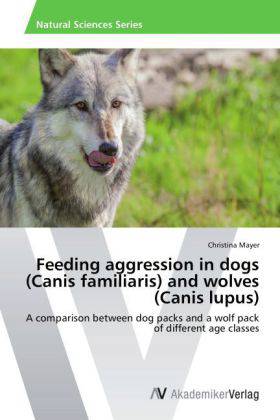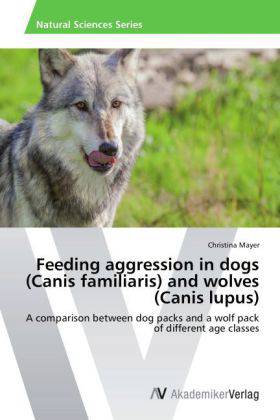
- Afhalen na 1 uur in een winkel met voorraad
- Gratis thuislevering in België vanaf € 30
- Ruim aanbod met 7 miljoen producten
- Afhalen na 1 uur in een winkel met voorraad
- Gratis thuislevering in België vanaf € 30
- Ruim aanbod met 7 miljoen producten
Zoeken
Feeding aggression in dogs (Canis familiaris) and wolves (Canis lupus)
A comparison between dog packs and a wolf pack of different age classes
Christina Mayer
Paperback | Engels
€ 23,95
+ 47 punten
Omschrijving
Aggression is a basic behaviour in all animals and plays an important role in the survival and reproduction of animals. It arises in competition for limited resources, like food. When the food is clumped there is more aggression found whereas with distributed food animals show more tolerance. This study investigated if there is a difference between the feeding behaviour and aggression of dogs and wolves which were living in packs and were raised in similar ways. In the literature there are two contradicting hypotheses if dogs or wolves should be more tolerant in this co-feeding experiment. The "Relaxed selection" hypothesis predicts that dogs show more and stronger aggression than wolves because due to domestication, dogs don't need to rely on interactions and cooperation with conspecifics any more. In contrast according to the "Emotional reactivity" hypothesis wolves should show more aggression than dogs because during domestication wolves were actively selected against fear and aggression. In this book two packs of mixed-breed dogs and one pack of timber wolves were tested in four different conditions to see if their behaviour changed from monopolizable to distributed food.
Specificaties
Betrokkenen
- Auteur(s):
- Uitgeverij:
Inhoud
- Aantal bladzijden:
- 72
- Taal:
- Engels
Eigenschappen
- Productcode (EAN):
- 9783639496895
- Verschijningsdatum:
- 2/06/2014
- Uitvoering:
- Paperback
- Formaat:
- Trade paperback (VS)
- Afmetingen:
- 152 mm x 229 mm
- Gewicht:
- 117 g

Alleen bij Standaard Boekhandel
+ 47 punten op je klantenkaart van Standaard Boekhandel
Beoordelingen
We publiceren alleen reviews die voldoen aan de voorwaarden voor reviews. Bekijk onze voorwaarden voor reviews.











